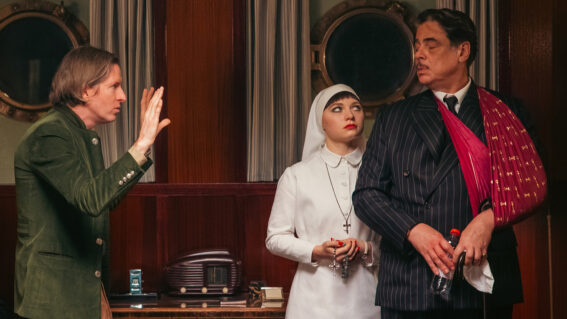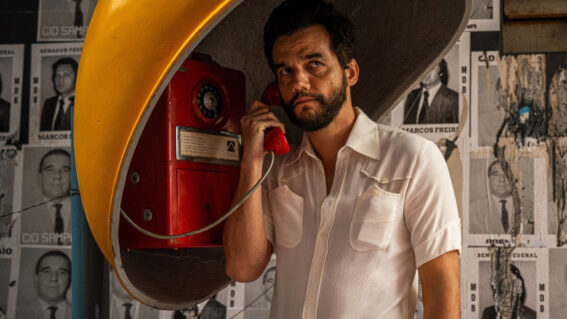A spoiler-heavy unpacking of The Rehearsal’s season 2 finale
Contains major spoilers for season two of Nathan Fielder’s masterpiece – including the final episode.

Clarisse Loughrey’s Show of the Week column spotlights a new show to watch or skip. This week: The season two finale of The Rehearsal takes an elaborate trip to a very specific destination.
WARNING: Contains major spoilers for season two – including the final episode.
There’s an intense and specific mania that Nathan Fielder’s work tends to provoke in people. Everyone’s aware that in Nathan for You and The Rehearsal, Fielder is playing the character of “Nathan Fielder”. “Fielder” is inspired by Fielder’s own anxieties, but they’ve been inflated to a point of comedic extreme, where he’s concocting elaborate schemes involving building exact replicas of real locations and hiring actors so that he can prepare for every outcome and better function in society.
Yet, viewers and critics alike are obsessed with trying to catch the moment the mask slips, that one revealing word or expression that suddenly transforms the work into honest self-examination. It’s understandable. Art creates its own intimacy. It’s the safe space in which we’re allowed to be direct and vulnerable with each other. It’s the cotton wool we wrap around difficult or confusing emotions. It forges connections between total strangers. That’s beautiful. But Fielder’s brand of comedy consistently builds up and then frustrates that connection by prodding at the other (equally legitimate) truth about art, that it’s also all about deception and manipulation, about knowing how to hit the right buttons in the right sequence to leave an audience as putty in your hands.
Related reading:
* The Rehearsal season 2: still brilliantly unhinged, now with diapers
* Show of the Week: A newly liberated psyche comes to understand itself in warm, funny Murderbot
* Netflix’s chaotic Everybody’s Live With John Mulaney makes other TV look so freaking safe
That was true when The Rehearsal’s first season called into the question the psychological damage “Fielder” might have inflicted on a child actor by pretending to be his fake daddy in an effort to explore his own feelings about parenthood. Maybe the kid was genuinely distraught. Maybe it was merely edited to look that way. The fact we can’t know for sure is entirely the point.
And it’s especially true when “Fielder” realises, in season two’s closing episodes, that he might actually be autistic, in what is a relatively brief aside in his larger bid to improve aviation safety so that he can demonstrate that “a clown can change the world after all”. He looks himself up on the internet, curious to see if anyone out there takes him seriously, only to discover that his work resonates deeply with the autistic community. It’s not hard to figure out why: being autistic mostly involves being stuck in a perpetual state of practice, planning, and scheming, hoping to unlock the hidden code that allows them to blend into neurotypical society in the ways that come naturally to everyone else.

Cut to “Fielder”, sat at the desk of the CEO of an applied behaviour analysis organisation (which, it should be noted, is a highly controversial practice which theorises that children can simply “practice” their way out of autism, making it highly relevant to what Fielder is exploring here), being repeatedly referred to as autistic despite his protestations. He’s shown some dubious test about recognising emotions purely from a person’s eyes. He fails spectacularly at it.
One episode later, having spent years acquiring a pilot’s licence, he goes ahead with ferrying a Boeing 737 full of actors posing as passengers despite still waiting on the results of an fMRI brain scan which would supposedly confirm (despite being another dubious practice) whether he’s autistic or not. It’s a diagnosis that would potentially mean his licence is revoked. When he eventually gets a call back from the doctor, he deletes the voicemail.
“Fielder” has spent an entire series asking why so many plane crashes seem to happen because a co-pilot is too afraid to speak up and be honest at the crucial moment, and why so many pilots avoid therapy and doctors because the wrong diagnosis could end their careers, only to replicate that same behaviour. “They only let the smartest and best people fly a plane of this size, and it feels good to know that,” he tells himself, after the reveal that he’s continued to fly for private companies. “No one is allowed in the cockpit if there’s something wrong with them. So if you’re here, you must be fine.”

There’s a lot going on here. None of it, really, is about who Fielder is as a person. There’s no personal revelation here—that sly little bit of biography he drops about how everyone thought he was a terrible magician as a kid because there was “something off about me” is too plainly toying with the audience’s sympathies to read as a genuine confession. The point here isn’t whether or not Fielder is autistic. It’s that everyone assumes he is. And he knows that.
He seeks out an untrustworthy autism “expert” who diagnoses him purely off the fact he makes television shows about the difficulties of navigating social situations—which, as “Fielder”does rightly point out, is something everyone suffers from to some degree, only autistic people with more consistency and severity. Fielder’s work appeals to everyone, it’s only that, for allistic people, there’s more of a comic exaggeration and, for autistic people, more of a direct relatability. At no point does the CEO seem interested in, or mention, any of the other crucial diagnostic criteria (sensory issues, repetitive behaviour, emotional regulation etc. etc.).

In fact, The Rehearsal has dealt consistently with the difficulty people often have with defining boundaries: between reality and fiction, truth and performance, social anxiety and autism. I can’t help but wonder how the neurotypical audience’s perception of Fielder would shift if he, in real life, were to pursue an autism diagnosis. It’s one thing when those audiences speculate or talk about the autistic-coding they see, another when they’re actually confronted by the real thing. Would HBO ever commission a series like Nathan for You if it were presented from the perspective of a publicly diagnosed autistic person, considering the vast majority of television that directly depicts autistic people is of the patronising, Love on the Spectrum kind?
That’s the tragic streak behind the moment “Fielder” deletes the voicemail from his doctor. On one level, we’re looking at a guy in denial, someone desperately craving to be perceived as “normal”. On another, he’s just proven he can fly and land a commercial jet, something that, with an autism diagnosis, he’d potentially be prevented from ever doing again without any logical reason. And all because people’s attitudes change after a diagnosis. An autistic person can fly a plane until people find out they’re autistic. An autistic comedian can write and direct absurdist satire until people find out they’re autistic. Then, suddenly, they get put into a tiny box. Someone at the end of The Rehearsal has decided to keep the mask on, but whether it’s Fielder or “Fielder”—well, that’s the big punchline.





















